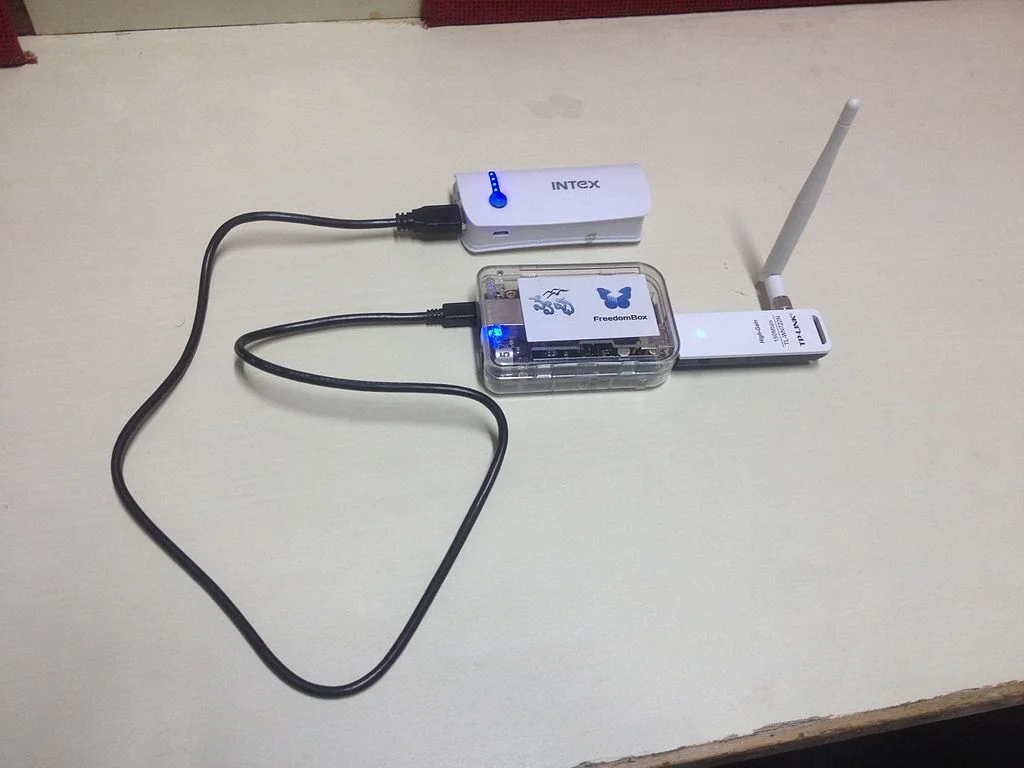Recently, I learned about FreedomBox, a personal server that allows you to use the Internet privately or in locations that have bad or no Internet connection. I was visiting Swecha, a non-profit in the Indian city of Hyderabad that is working to bring about social change with the use of free and open source software, as part of the Free Software Movement of India. The FreedomBox is a revolution in itself and a big part of their initiative.
According to the open source operating system Debian wiki page, FreedomBox is a free software stack that is able to host applications like file sharing, shared calendaring, instant messaging, secure voice conference calling, blogs, and wikis. And, it can be installed on one of the supported hardware devices, installed on a standard Debian machine, or deployed on a virtual machine. FreedomBox has the ability to store data and provides secure instant messaging and voice conference calling that works on low bandwidth.

Photo by Subhashish Panigrahi (Own work) CC BY-SA 4.0, via Wikimedia Commons
FreedomBox also has a blog and wiki that allows you publish your content and collaborate with the rest of the world. Coming soon is a personal email server and federated social networking using GNU Social and Diaspora to provide alternatives to Gmail and Facebook.
Of interest to the volunteers for the non-profit Swecha is the ability to provide uninterrupted high quality video streaming between participants. They want to be able to provide an educational, classroom-type experience to an entire village and are working on a prototype for that now. The volunteers are also interested in helping farmers take care of their crops and irrigate their land in remote villages with FreedomBox.
From the FreedomBox manual:
FreedomBox runs in a physical computer and can route your traffic. It can sit between various devices at home such as mobiles, laptops and TVs and the Internet replacing a home wireless router. By routing traffic, FreedomBox can remove tracking advertisements and malicious web bugs before they ever reach your devices. FreedomBox can cloak your location and protect your anonymity by ‘onion routing’ your traffic over Tor. FreedomBox provides a VPN server that you can use while you are away from home to keep your traffic secret on untrusted public wireless networks and to securely access various devices at home.
At the Columbia Law Conference in New York City this year, Sunil Mohan Adapa co-presented with the FreedomBox founder, Eben Moglen. They demonstrated how easy it is to set up a FreedomBox: Sunil connects a Internet network cable and a power cable, then he turns the device on. He explains that FreedomBox recognizes what kind of hardware it is running on and ultimately provides a WiFi network. He tells us it is like a WiFi router we have at home, but it does more. FreedomBox prevents malicious ads from tracking users and it can route the traffic via other computers and hardware devices ensuring an enhanced level of privacy.
In this interview, I ask Eben and Sunil to explain more about the FreedomBox.

Subhashish Panigrahi: Though it is quite unnerving to ask such a question, I am curious to know what level the hardware is free and open source, like the software for FreedomBox?
Sunil Mohan Adapa: There is certainly a subconscious effort to keep the entire system free as in freedom of knowledge ensuring use of both free and open hardware and software. We have the following hardware supported for FreedomBox:
- Cubietruck (or the Danube edition)
- BeagleBone Black
- APU 1D
- Raspberry Pi
- Raspberry Pi 2
- Dreamplug
- VirtualBox and KVM virtual machines
- Any machine that can run Debian
While all of these run fully free software, some of the firmware that runs on some of these devices is proprietary as the alternative free software is not available. So, of these, only three single board computers are recommended because they run completely free software and free firmware:
- Cubietruck
- BeagleBone BLACK
- APU 1D
Of these, the BeagleBone BLACK is also open hardware. Meaning that the blueprints required to make a similar device with modifications using a different manufacturer are all available. In the pipeline is support for another open hardware device called A20 OLinuXino LIME2 from Olimex.
Subhashish Panigrahi: During my visit to Swecha, the student interns currently working on the product told me that they are planning to install a few in the nearby villages where access to the Internet is a dream. Hopefully FreedomBox could help provide connectivity them to help them learn how to use live video streaming. Could you please share any stories with us?
Eben Moglen: The folks in Andhra Pradesh and Telengana in India will have more to say about the real world current deployments of FreedomBox, but I can say that FreedomBox is going to play five main roles beginning soon:
- Replacing standard WiFi routers in homes and businesses, creating networks with privacy protection and secure interconnection, including doing ad removal and bug protection for web surfing everywhere.
- As low-end secure servers, offering public services to anyone on the Internet, from which any household receiving a WiFi signal can use.
- As WiFi client dongles, to provide fully mobile secure communications over public WiFi networks.
- As boxes kept in secure locations that provide secure organizational IT (such as a Tor-based hidden wiki, secure text messaging over encrypted XMPP, secure multi-party voice chat using Mumble, secure shared calendaring, etc.) for any kind of social entity, church group, family, club, political party cell, law practice, or other group.
- As village-level communications routers, joined by WiMAX or other medium-range radio from village to village, to provide alternative telecommunications networks in developing areas. Using OpenBTS, which we will be including in FreedomBox soon, and with cheap additional hardware, a FreedomBox can talk directly to GSM handsets, to provide alternatives to commercial mobile services.







2 Comments